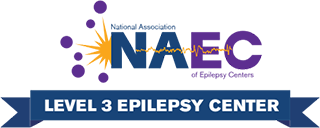The Epilepsy Program at CHKD encompasses both diagnosis and treatment for individuals from birth to early adulthood with seizures or suspected seizures.
Learn More About CHKD's Level 3 Accredited Neuroscience Unit
The Science of Diagnosing Epilepsy
 For those with newly diagnosed seizures or movements or “spells” concerning seizures, CHKD has state-of-the-art video EEG equipment to enable the neurologists and epileptologists – or neurologists who specialize in epilepsy – to confirm the presence of seizures or to reassure families that their child does is not having
seizures.
For those with newly diagnosed seizures or movements or “spells” concerning seizures, CHKD has state-of-the-art video EEG equipment to enable the neurologists and epileptologists – or neurologists who specialize in epilepsy – to confirm the presence of seizures or to reassure families that their child does is not having
seizures.
Routine EEGs can take from one to two hours in the
EEG lab.
In certain situations, your doctor may order a more prolonged EEG (several hours to all day in the EEG lab), an ambulatory EEG (the child wears a recording device at home), or an inpatient video EEG that runs continuously for several days in the hospital (a parent or guardian stays with the patient during their stay to “identify” the events).
In addition to EEGs, the neurologists may order blood work (sometimes including advanced genetic studies) or brain imaging studies such as an MRI to aid in the diagnosis.
How We Treat Epilepsy
Most individuals with seizures will require treatment of some type. Typically, patients begin with specific medication selected based on the person’s seizure type,other medical/personal issues and side effects.
In addition to the standard medications used, the neurologists in the Epilepsy Program often participate in research studies involving new medications. This offers patients who have not responded to standard medication the option of newer, potentially more effective medications.
Non-medication Treatments
The Epilepsy Program at CHKD also has non-medication treatment options available for those individuals for whom medications don’t work or are not tolerated. This includes VNS (Vagal Nerve Stimulator) and dietary therapies including Ketogenic Diet and Modified Adkins Diet.
The Epilepsy Program has recently expanded its dietary/nutrition services. CHKD has recently hired a Ketogenic Diet dietitian and started a dedicated Ketogenic Diet/Modified Adkins Diet clinic. This clinic allows the neurologist and dietitian to focus on the specific needs and issues involved to help families implement the diet successfully.
The neurologists within our program work closely with the
neurosurgeons at CHKD in those cases where surgery is indicated or an option.
We Are Here To Help In All Ways
In addition to the Ketogenic Diet and dietitian, our program also utilizes other services to aid in the diagnosis and treatment of epilepsy. These include a neuroradiologist, a pediatric neuropsychologist, a pharmacist specializing in the various anti-seizure medications, and a social worker.